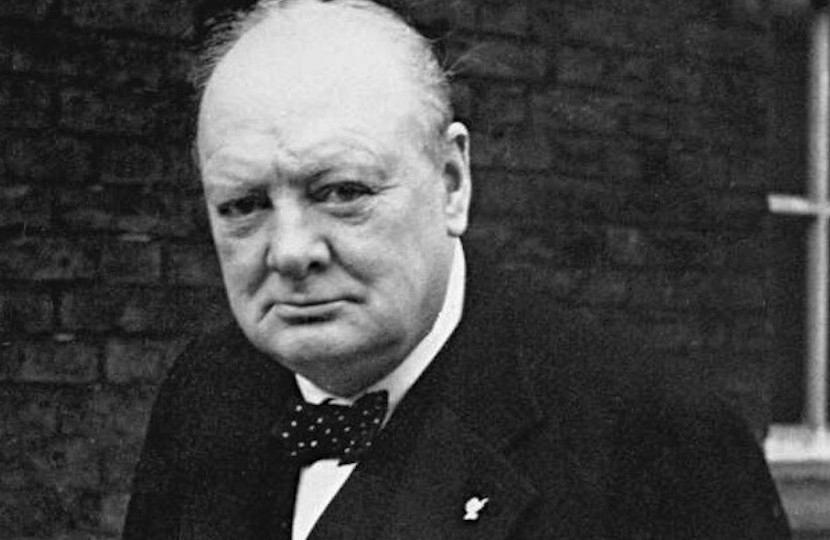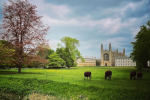
Alistair Lexden has studied the 1945 general election in some detail from Churchill’s perspective. His conclusions were published in Parliament’s magazine The House on 2 June.
On 25 July, the day before his election disaster became clear, Churchill and his outstanding Foreign Secretary, Anthony Eden, flew back to London from Potsdam, where they had been taking part in the last great conference of the Allied leaders of the Second World War.
They were joined at Potsdam by the Labour leader, Clem Attlee, whom Churchill invited to show, in his words, that “we were a united nation”, despite the end of the war-time coalition in May. Many Conservatives had wanted to extend it until the defeat of Japan, or even longer, and defer the election.
Churchill argued for this strenuously, suggesting a referendum to get the nation’s approval for delay, but the Labour Party refused to agree. He then formed a new Government without it, and prepared for an election.
Everywhere a resounding Tory victory was anticipated on 26 July when the election results were due to be declared. No one was more confident of it than “Uncle Joe” Stalin, basking briefly in British war-time affection. Wholly unable to understand that an election might be free and fair, Stalin told Churchill’s Private Secretary, Jock Colville, at Potsdam that the British poll would of course be “fixed” to ensure a majority for the British prime minister.
All leading British politicians (with the single exception of Rab Butler) expected such a result without any sinister helping hand for the Tories. On the flight back from Potsdam, Eden speculated: “Would the government get a majority of fifty or more; or perhaps less?” Labour did not dissent. Attlee told Colville that “in his most optimistic dreams he reckoned that there might be a Conservative majority of only some forty seats.”
For his part, Churchill never had the slightest doubt that “the British people would wish me to continue my work.” The campaign strengthened that conviction. He was acclaimed wherever he went.
“He addressed vast and enthusiastic crowds at Leeds, Bradford and Preston”, Colville recorded in the final stages of the campaign. “The train moved to Glasgow where he made ten speeches to deafening applause. He drove to Edinburgh along roads thronged with cheering men, women and children, and when he finally returned to the train, after a reception in Edinburgh as warm and moving as in Glasgow, he said to me that nobody who had seen what he had that day could have any doubt as to the result of the coming election.”
Conservative Central Office promised him a majority of 211.
The votes that confounded the confident predictions of Tory victory, and gave Labour an overall majority of 146, had been cast three weeks earlier on 5 July. The count was delayed to enable the ballots of servicemen and women across the globe to be collected and delivered to their constituencies.
In the aftermath of their shock election defeat, many Tories came to believe that men and women in the services, indoctrinated by left-wing lecturers in the Army Bureau of Current Affairs, had contributed decisively to their humiliation. The writer and MP, Harold Nicolson, noted in his diary on 13 June that “the Tories feel that the Forces will all vote Labour.”
They did not determine the outcome. The total number of service votes cast was far less than Labour’s lead in the national popular vote. The Tories were swept away by a great tide of popular hostility, of which service voters were a part.
At No 10 Mrs Churchill, a lifelong Liberal supporter, had a much-quoted exchange with her husband. “it may well be a blessing in disguise”, she said. “At the moment”, replied Churchill, "it seems quite effectively disguised."
At 7 pm he was driven to Buckingham Palace where he tendered his resignation to the King, who offered him the Garter. Churchill declined it. “I felt that the times were too sad for honours or rewards.”
After Churchill had departed in his chauffeur-driven Rolls, Mrs Attlee drove her husband into the Palace forecourt in their small family car at 7.30pm.
*
To what extent was Churchill himself responsible for his election disaster?
During the campaign he pursued a baffling, erratic course, not uncommon during his long career. At some points he was the epitome of moderation; at others he was the embodiment of right-wing recklessness.
On policy issues, bipartisanship ruled. Churchill’s election manifesto (a personal, not a party, document) made clear that he would implement the plans for peace formulated by the war-time coalition rather than striking out out in a new distinctively Tory direction. He stood as a Conservative and National candidate, and made great play with the second part of his label.
He wrote that “my hope was that it would be possible to reconstitute the National Coalition Government in the proportions of the new House of Commons.”
Hw did not want a purely Tory government. “People liked the late Coalition Government”, he said on 30 June. He aimed to become head of another one.
Agreement on a post-election coalition programme would have caused little difficulty. The Times noted in its coverage of the campaign that the parties “fought the election on programmes which contained very much in common. [They were] at one in promising to give early legislative effect to the social reforms agreed by the Coalition Government,particularly those for a comprehensive and extended system of national insurance and for a national health service. All of them adopted the Coalition policy of accepting as a prime responsibility of the Government the maintenance of a high and stable level of employment; and all pledged themselves to apply emergency methods to the provision of housing.”
It seemed that the election would be conducted in a mood of sweet reasonableness. Churchill, the arch-coalitionist, suddenly shattered it in a manner that was never to be forgotten.
In a series four election broadcasts he attacked the Labour Party in fierce, lurid terms. On 4 June, the Prime Minister warned electors that Labour planned to impose full-blooded socialism on Britain, establishing “some form of Gestapo” (he pronounced the word as menacingly as he could) as they gathered “ all the power to the supreme party and the party leaders.”
To ensure that no one missed the parallel with the evil regimes in Europe, he added that “there can be no doubt that Socialism is inseparably interwoven with Totalitarianism and the abject worship of the State.”
Some blamed two reckless political buccaneers, Brendan Bracken and Lord Beaverbrook, who were at his side him during the campaign, but the notorious “ Gestapo” speech was written by Churchill himself.
His wife and senior colleagues were horrified. Nevertheless, there was more in a similar vein in his subsequent broadcasts, though with a better balance between abuse and positive comments about post-war reconstruction.
Amongst the election radio audience, the reaction of the poet and novelist, Vita Sackville-Weat, was not untypical. “You know I have an admiration for Winston amounting to idolatry”, she wrote to her husband,Harold Nicolson, “so I am dreadfully distressed by the badness of his broadcast election speeches. What has gone wrong with him? If I were a wobbler, they would tip me over to the other side.”
There was an indication of what was to come at the polls when Churchill addressed his final rally at Walthamstow. A crowd of 20,000 booed him.
Anthony Eden, then at the height of his powers and ready to take over the Tory leadership (which Churchill said in 1945 he would give up), reflected wisely in his diary on the evening of the day that brought election disaster. “While there is much gratitude to W as war leader, there is not the same enthusiasm for him as PM of the peace. And who shall say that the British people were wrong in this?”

